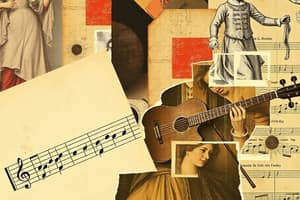Podcast
Questions and Answers
Which characteristic is NOT associated with the Classical music period?
Which characteristic is NOT associated with the Classical music period?
- Simple harmony
- Use of rubato (correct)
- Homophonic texture
- Gentle dynamic shaping
What feature distinguishes 20th century music from earlier periods?
What feature distinguishes 20th century music from earlier periods?
- Symmetrically structured phrases
- Strong repeated chords (correct)
- Use of crescendos and decrescendos
- Graceful melodies
Which option best describes the dynamic characteristics of Romantic music?
Which option best describes the dynamic characteristics of Romantic music?
- Sudden mood changes
- Rich harmonies and thick chords (correct)
- Spiky articulation
- Wide dynamic range
Which characteristic is primarily found in the 20th-century jazz style?
Which characteristic is primarily found in the 20th-century jazz style?
What is a common feature of both Romantic and Classical music?
What is a common feature of both Romantic and Classical music?
Flashcards are hidden until you start studying
Study Notes
Baroque
- 17th Century
Classical
- 18th century
- Homophonic texture (melody and accompaniment)
- Graceful melody
- Simple accompaniment
- Clearly defined, symmetrical, and regular phrases
- Repeated ideas
- Use of scale and arpeggio patterns
- Gentle dynamic shaping
- Frequent use of crescendos and decrescendos
- Simple harmony
Romantic
- 19th century
- Expressive, song-like, and lyrical melody with accompaniment
- Homophonic texture (melody and accompaniment)
- Use of rubato
- Use of sustaining pedal
- Rich harmonies and thick chords
20th Century
- Strong repeated chords
- Percussive sounds
- Spiky articulation
- Wide dynamic range
- Extreme dynamic contrast
- Sudden dynamic and mood changes
- Use of accents and off-beat accents
- Use of syncopations
- Use of dissonance
- Unrelated chords
- Contrasts between major and minor
- Changes of tempo
20th Century (Jazz)
- Jazzy style including bluesy tune and chords
- Swing rhythms
- Flexible rhythms (rubato)
- Syncopated rhythms and off-beat accents
Studying That Suits You
Use AI to generate personalized quizzes and flashcards to suit your learning preferences.




